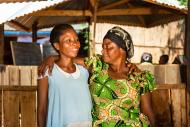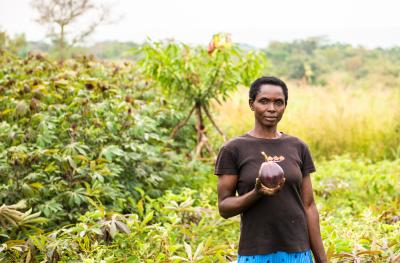Raja is a courageous Iraqi woman and mother of five raising her children in a refugee camp in the Kurdistan Region of Iraq. She has been internally-displaced and single-parenting since 2016.
Before the war, Raja’s husband worked for the Iraqi army, but he was forced to leave his job when ISIS took over. The family was afraid that he would be beheaded for his role in the military. To provide for themselves, Raja and her husband sold their house and their car, but they still struggled in poverty. To make matter worse, when conflict in their area intensified, the family had to flee. Raja’s husband did not survive the journey. She didn’t have the time to mourn.
Raja is a courageous Iraqi woman and mother of five raising her children in a refugee camp in the Kurdistan Region of Iraq. She has been internally-displaced and single-parenting since 2016. Before the war, Raja’s husband worked for the Iraqi army, but he was forced to leave his job when ISIS took over. The family was afraid that he would be beheaded for his role in the military. To provide for themselves, Raja and her husband sold their house and their car, but they still struggled in poverty. To make matter worse, when conflict in their area intensified, the family had to flee. Raja’s husband did not survive the journey. She didn’t have the time to mourn.
“I am the mother and the father. I have no one now,” Raja says.
Raising a family alone is never easy. Add to that, the agony of being displaced, losing your home, community and support systems, being a woman in a patriarchal society, and facing poverty, and the situation becomes unimaginable for many of us. The truth is that what happened to Raja is not exceptional. At its height, conflict in Iraq displaced more than five million people and since 2011 and more than 5.6 million people have fled Syria. While a lot of attention has been paid to Syrian and Iraqi refugees and displaced communities, and rightly so, they are not anomaly in our conflict-ridden world. Nearly 4.5 million Congolese are internally displace and more than 2.4 million South Sudanese people have been forced out of their homes due to conflict and their lives and stories have been largely ignored.
This is why Women for Women International is serving Raja, and women like her, in the Kurdistan Region of Iraq and just launched partnerships to serve more Syrian refugee women in Jordan and South Sudanese refugees in Uganda. When the world is on fire and our sister are bearing the brunt of it, we can’t be idle. We can’t leave them alone.
Displaced and refugee women continue to face disproportionate levels of violence and lack access to opportunities even as they become the single heads of their households. In Jordan, 34% of Syrian women refugees are now heading their families alone. Poverty and lack of safe spaces and economic opportunity is also contributing to a rise in violence against women and girls. For example, the rate of child marriage among Syrian refugees in Jordan has more than doubled since 2014. According to the International Organization for Migration (IOM), nearly half a million Iraqi IDPs live in critical shelters, including unfinished buildings, schools, or abandoned houses, making it less safe for women to be protected against aggression. Refugee women and girls face increased threats of sexual violence and have few, if any, resources to fight the stigma that haunts them after experiencing rape or other forms of violence.
In the context of South Sudan, too, women continue to be further marginalized in the context of war. Conflict has scared not only the infrastructure and economy of the country, but also caused perhaps irreparable emotional trauma. A recent report showed that, due to continued violence, one in four South Sudanese girl struggles with suicidal thoughts. Rape has been used by all parties involved in the conflict as a weapon of war and violence in the state level has normalized violence at home. In South Sudan, the rate of violence against women and girls in South Sudan is double the global average.
What happened to Raja and millions of other women and families fleeing from conflict could happen to any one of us. It is only our circumstances and the fact that we were born in relatively stable and powerful countries that has protected most of the readers of this piece and myself. Each and every woman, man, child who is facing the atrocities we rarely hear of deserves a chance at a better life, a more compassionate world, and at least, basic safety and shelter.
When Women for Women International staff met Raja, she was all alone. She told us, “I don’t have anything here, I just sit and cry.” Then she joined our program. Now she has friends and has learned how to sew. She shares a sewing machine with other women in the program, but she has a dream to one day buy one of her own.
Raja’s story is not over. She’s actually at the beginning of her journey. She still struggles to earn money and feed her children but now she knows that she has a support system and that someone believes that she is valuable and worthy of compassion, acceptance, and investment.
As World Refugee Day is commemorated around the world I recall powerful words from world-renowned Pulitzer Prize-winning photojournalist Lynsey Addario. Speaking at Women for Women International’s annual luncheon, she said:
“They are not refugees. They are women. They are children. They are people exactly like us. They have the same goals, the same desires to provide their children with a safe life and education. They have the same dreams that we have. It just so happens that there is a war in their country and they have to flee. How can you turn your back on them?”
The answer is, we can’t.


